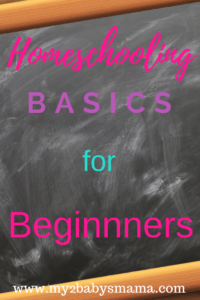Homeschooling Basics for Beginners

Homeschooling Basics for Beginners
Sometimes homeschooling gives you the greatest joy but it also provides your biggest struggle.. It overwhelms you, and it’s difficult to find the basics of where to even start. Every day you stay at home with your children, seemingly oblivious to the world outside the walls of your home. The entire responsibility of choosing what and how to teach rests completely on your shoulders. Even though there are resources that can help in your decision making, the feeling can still overwhelm you.
I knew that I wanted to be a teacher since I turned nine years old. I chose to teach second grade during ninth grade algebra. 7 year olds don’t need algebra! But teaching in a school is worlds away from teaching my own children at home. As a teacher, I used the curriculum chosen for me by the school for which I worked. My job was to follow the curriculum assigned to me. That curriculum told me exactly what to do and when to do it. It followed sequentially each day. My principal presented the plan for my classroom, and I followed it.
Even before I became a mama, I knew I wanted to homeschool my children. There was no question about that. Almost immediately after Super Stuffy’s birth, I started to research the different methods of homeschooling. However, it did not take long for me to get buried under the enormous amount of available information I found.
I searched for homeschooling blogs to find stories from mamas who have gone through where I was right now. Learning other’s stories would help me know what to do. I consumed all of the stories that I could find. Understanding their stories might help me.
Now, my life revolves around homeschooling my children and spending time with them. As they reach toward more independence, I want to share my homeschooling journey with others so that I can help other mamas who are just starting on this journey just as others’ stories helped me. I have homeschooled now for seven years, and while I may not be an expert, I do have some ideas and tips that I hope will help others in their own homeschooling journey.
What is Homeschooling?
Homeschooling means nothing more than schooling at home. Homeschooling takes many forms, from creating a school classroom at home with pre-packaged curriculum all the way to unschooling, which is based on learner chosen activities and learning from real life experiences. It does not necessarily use any specific curriculum, although it can. Most parents choose different methods along this spectrum. I myself use some curriculum but I also use videos, living books and real life experiences. Homeschooling gives you the freedom to choose what you want to teach your children, it lets you move at a pace which fits your child, and you can choose the method of teaching that works best for you and your children.
Common Misconceptions about Homeschooling
For those who are not experienced with homeschooling, there are many misconceptions that can cause confusion and misunderstanding.
Misconception #1: What about socialization?
This is perhaps the biggest question that people ask about homeschooling. How does a child become properly socialized if he/she doesn’t go to school? As if the only way to socialize is when you are stuck in a room with people of your same age. Along with socialization are the questions such as, “How will they learn how to take turns?” “Where will they learn how to stand in line?” How will they learn how to deal with bullies?” “Will they be able to make friends?”
My children have made friends of many ages. In church, they are able to talk to grandparents as well as toddlers and every age in between. Artificial separation by age does not happen in my children’s lives. They interact with people. We live in the real world, where you have to stand in line in the grocery store, where taking turns and sharing is just common courtesy, where we can make a friend in an afternoon of playing at the park. This does not include all of the activities that my children are involved in: tae kwon do, gymnastics, ballet, and hockey. For me, learning about drugs, alcohol, peer pressure, and bullying is a good reason to not send my children to school.
Misconception #2: You need to be certified in order to homeschool
Some people believe that in order to receive a good education you need to be taught by a certified teacher or instructor. But, as our society has proven, even going to a good school does not guarantee you a great education. Two people have a responsibility in the education process: the teacher and the student. I have ten years of honest to goodness teaching experience in the classroom, and I know that no matter how good the teacher is, you cannot force a student to learn. There are many students who graduate high school without knowing how to read or to do basic math.
In homeschooling I have an added advantage: I can teach my children in a way that gets them excited to learn at their own pace. I can preserve their love of learning which is more difficult to keep in a classroom. Also, as a trained schoolteacher, I can honestly say that most of my college education which granted me my teaching degree consisted of learning how to control behavior in a classroom, not how to teach the kids in that classroom. Since I teach only my own, all of the classroom management I learned in college does not apply.
Did you as a parent need a teaching degree to teach your child how to crawl, eat, walk, and talk? Most parents teach their children the ABC’s and how to count. What happened to make you all of a sudden incapable of teaching your own children what they need for life? I am able to teach my children the basics of math and reading, and when they go beyond my abilities, then there are multiple resources available for them to learn. Our homeschool co-op classes, learning a trade from someone in the community, books, and an endless supply of information on the internet are all available to my child. Once my children get to high school, some colleges allow dual enrollment or even online classes.
The most important thing that I can teach my child is how to learn and find out information. If I have done that, they can learn anything that they want or need.
Misconception #3: Homeschooling is religious indoctrination
Many people argue that homeschoolers try to isolate their children from the world and “force their religious beliefs” on their children. They say that homeschoolers indoctrinate their children and only teach them one point of view. It is true that I teach my children from a Christian worldview, and I hope that they will make my worldview their own, but I would like to turn this question on its head.
Since homeschooling has been dominated by Christian parents, it is easy for those on the outside to think that we are producing closed minded intolerant children. But just for the sake of argument let’s say that most homeschooling parents were agnostics or atheists. Would you not, as an atheist or agnostic parent, teach your children from your own worldview?
As a Christian, I teach my children based on the assumption that God is real and there is a certain standard that He demands from us. As an agnostic or atheist, wouldn’t you be teaching your children based on the assumption that God does not exist and so there is no firm moral standard by which we must behave? Would you be willing to teach your children at least what the Christian worldview is? If not, wouldn’t you be guilty of being close minded and intolerant? Do you not wish for your children to believe as you do? Would you let them make their own choice if they chose to believe in Jesus?
I myself have a family member who has determined that he will not force religious beliefs upon his son. But the truth is, no matter how much you say that you will not force your beliefs on your children, they are influenced by them. Children do pick up the beliefs of their parents, whether explicitly taught or not. I just choose to teach them from my worldview, knowing that when they come of age, they will make their own choices based on what they have learned, not only from me, but also from the world around us.
Misconception #4: Homeschooling makes it easier for parents to abuse their children.
We all have heard those stories about parents who have abused their children and claimed that they were homeschooling. These stories break my heart, because true homeschooling parents care about their children and want to do what is best for them. However, because of this, some people have proposed that we put more restrictions on all homeschooling parents. The fact is, there are many studies to show that there is no statistical difference between the percentage of abused children in homeschooling as opposed to those who go to public school.
Most parents choose to homeschool because they are putting the needs of their children first. Going to school is no guarantee that a child is any safer. We all have also heard the stories about teachers who have abused their students. Before you get upset that I am painting with too broad a brush, I want to say this. Just as a majority of teachers are not abusers, so it is the same with homeschooling parents. An abusive parent will abuse no matter where their child goes to school. It is wrong to penalize legitimate homeschooling parents because an abusive parent uses homeschooling as a cover to continue abusing their child. Just as much as it would be wrong to close an entire school down to get rid of an abusive teacher.
Misconception #5: I couldn’t stay home with my kids all day, they would drive me crazy.
I do have to admit that as a homeschooling mama, sometimes I do wish that I could break away from my kids at times. It is sometimes very hard to be with my children all the time with no down time. But I am discovering that homeschooling is just as much about teaching me as it is teaching my children. We are learning together, not just academics, but how to get along with each other. Since we are together all of the time, we have to figure out a way to get along together. My children and I have learned empathy, compassion, kindness, and mercy by being with each other day in and day out. These life lessons are hundreds of times more important than any academics.
My kids do drive me crazy sometimes, but they also cause me to laugh hysterically, to look at an issue from a completely different perspective, and to challenge my assumptions. If you are looking into homeschooling, don’t let this misconception derail you. If you want to homeschool, you will find a way to be able to spend each day with your children. You will get to know them inside and out and discover just how beautiful those little souls are.
How to get started with Homeschooling
Pray
Since I am writing from a Christian perspective, this is my first piece of advice. I felt called by God to homeschool my children, and I wanted to make sure that I did not mistake that call. Also, homeschooling has its rough moments, and I prayed that God would give me the strength to persevere, day in and day out. Since He did not give me a specific stop sign, I continued with my homeschooling plans, trusting that He would guide me as I went through each day.
Research your state laws about homeschooling
Each state has different laws regulating homeschooling. Some states have very few restrictions while others have more stringent requirements. My state law says that each year I need to notify my local school district that I intend to homeschool. I also need to turn in standardized test results in 4th, 8th, and 11th grades. Your state department of education should have the requirements for homeschooling listed on their website. Just search out [your state] department of education. Print these out so that you can have them accessible when needed.
Find a local homeschooling group and get connected.
Even before I officially started homeschooling, I looked up my homeschooling group. We have homeschooling families of all ages, from preschool up to high school. Our group is a wonderful place to make new friends, meet each other for support, and learn new ways to homeschool. We have taken field trips together, my children have performed in Christmas and spring concerts, and we have scheduled playdates with other families in our group.. My children have made friends with kids of all different ages. And it has given me an opportunity to make friends with the other moms in my group.
Research different homeschooling methods
With the internet and the library you can find almost any information about homeschooling methods that you want. I started with Charlotte Mason and Ambleside Online, loosened up the reins on that a little bit, went to the opposite extreme to try unschooling, and right now I believe that I have found the happy medium between too rigid and too loose. Some people might call me electic, but I prefer to call myself a relaxed homeschooler. It may take some time to find the method(s) that work(s) for your family, but homeschooling gives you the freedom to try different things and tweak some others to make it right for you. There is no one right way to homeschool.
Basic Tips for Success in Homeschooling
There is only one major tip to be successful in homeschooling: you need to be flexible.
Be flexible in style
Sometimes what is the best way for you to teach is not the best way for your kids to learn. I love lectures and worksheets, but my children don’t function well in that way. I have to grow past my comfort zone to teach them in the way that is best for them.
Be flexible in curriculum
I have tried multiple curriculums in my seven years of homeschooling. Some of them I loved but my kids did not learn with them. Others have not fit with what I believe that our homeschool should look like. You don’t have to follow a prepackaged curriculum. Choose the resources that work well for you and don’t be afraid to drop the ones that don’t. Feel free to allow your children to learn through life experiences, videos, experiments, etc.
Be flexible in life
Life happens. It’s an unplanned beautiful day outside, and you have the choice to stay cooped up inside studying or enjoying the beauty outside. Go outside! Play at the park, or read books in the yard. The textbooks will still be there tomorrow. Your friend calls you over for a playdate, but you have schoolwork to do. Go! It will be fun for you and the kids. Everyone is just having a bad day and no learning is being done anyway. Play games! Or get out of the house. Learning happens all the time, not just when the textbooks are open. In a lot of ways my children have learned more from interacting with the world around them than they have from the textbook.
Common Questions/FAQ About Homeschooling
Am I qualified to teach my own children?
The short answer to this is absolutely! You do not need a college degree to teach your own children. Even though you are the most important teacher your child has, you do not have to be the only one. My children have learned from people in our homeschool group, from people in our community, and their friends. Even with all of the methods I tried in teaching my children how to read, they ultimately learned how to read without me. Their desire to do the things they wanted motivated them to learn how to read.
No one knows everything, and the most important thing that you need to teach your child is how to learn. You do not need a college degree to teach that. If your child knows how to learn and where to go to learn, then they will be motivated to learn what they need to get along in their world.
Does this mean that I can be hands off and just let my children learn on their own?
No! You are their parent, the ultimate guide to the world around them. I like to look at our homeschooling as a sheep pasture (you can just see the farm life peeking through 🙂 ) I give my children the boundaries in which they should stay, but they are free to do what they want inside those boundaries. Beyond the basics of reading, writing, and math, they are free to learn whatever they choose We learn by living life together. Real life problems are solved together in our daily lives. We discuss the things we read and see in our world. This also gives me an opportunity to truly know their hearts, their victories, and their struggles. I am able to come alongside them as they mature.
So can I use a packaged curriculum?
Yes! My children use a formal curriculum for math and spelling. However, we don’t necessarily follow the curriculum exactly as prescribed. Both of my children prefer doing their math work on our whiteboard. If your children learn best by using a curriculum, then by all means use it! But, come alongside them, even when they are working on worksheets. My son works on science from a textbook, but we don’t necessarily do all the bookwork associated with it. Our best learning times are the discussions that we have about what he reads. Be involved with their work, talk to them, learn alongside them.
Sometimes using a formal curriculum can be a starting point. I was so overwhelmed when I first started homeschooling that I needed to have some sort of direction. I had no idea what to teach my children so I followed the directions for awhile. That actually gave me the freedom to learn and figure out what works best for my family. Remember – just because you start with a curriculum does not mean that you are stuck with it. You can change at any time! There is a wonderful sense of freedom in that!
Won’t my kids miss out on a lot of opportunities afforded in school, like spending time with friends, field trips, sports, music classes, science labs, shop classes, prom, etc.?
Nowhere is it said that just because you homeschool your kids can only learn at home. Through our homeschool group we have PE classes, we take field trips, we’ve scheduled playdates with friends, and as my children get older there is even opportunity for science labs and speech classes. Depending on your local school district, your child can take a shop class or music classes in school. This year Super Stuffy goes to school twice a week for band.
You can call on other community members to teach some particular subject to your child. Some local business people might be willing to teach their trade/apprentice to your child. Some colleges and universities even allow double enrollment so that your high school student can take college courses right along with the college students. It is very possible to outsource bits and pieces of your child’s education to other resources.
As far as prom goes, I know that in my homeschool group we have our own prom night. Some homeschool groups might not have a prom, but there are multiple opportunities around for that to happen. And even if there are none where you are, then organize your own with other homeschoolers near you.
What if I ruin my child?
I am intimately familiar with this fear. Even though I have been homeschooling officially for seven years, that fear has only lessened in the past year. What if I mess up what they are learning? Will I teach them enough? Will they be able to get into college? What if they never learn to read? What if they don’t know how to make friends? The one thing I learned from our time with unschooling: they will learn what they need in order to do what they want to do.
For example, right now Super Stuffy loves video games. He loves working through them and figuring out how to defeat them. His computing knowledge has surpassed mine because he wants to figure out how to play these games. He works and puts in the effort to learn them. I have not taught him anything beyond the basics. He has taught himself everything else.
He wants to be a farmer when he grows up. Growing up in the city, I know next to nothing about farming. But he attaches himself to his daddy to learn how to farm. When learning something means that they can do something that they want to do, they will learn it.
Bear Bear is a budding artist. My attempt at art produces stick people. I cannot teach her art. But I did find an art curriculum that is specifically meant for children. She does her art on her own, but I come alongside her while she is creating her masterpieces. I spent very little time specifically teaching her how to read. My contribution to reading introduced her to the alphabet and I read to her often. I’m honestly not sure how she learned to read, but she is now reading chapter books that just a couple of months ago were beyond her capability.
I believe that the only way to ruin your child while homeschooling is to completely unattach yourself from them. If you are sharing your life and time, living your life with them, you will not ruin them. You will learn when to push a little harder and when to let them alone so that they can learn how to swim. If you will include them in your life, they will grow to be confident people who know how to interact with their world.
If I start homeschooling, can I put my child back in school if necessary?
I started homeschooling with the understanding with my husband that we would take it a year at a time. If either one of us decided that it wasn’t working, then we would discuss putting them in school.
During the last school year, Bear Bear wanted to try out school and see what it was like. For a couple of days she expressed a desire to go to school. It broke my heart, but my husband and I considered how we could do it. She eventually changed her mind, but we were willing to consider it.
Since then, I have thought a great deal about it. I have determined that putting my child in school would be dependent on several factors: their age, the school district, the reason that they wanted to go to school, etc. It would be absolutely possible to enroll them in school.
The Last Thing You Need to Know about the homeschooling basics
Homeschooling takes a great commitment. You need to weigh all the pros and cons, do your research into the homeschooling laws and methods of homeschooling, and research the curriculum that you might want to use. Homeschooling requires a lot of time and work, and it takes a long time to see the fruits of your efforts, but the dividends that pay off in the end are so worth it. You will find your relationship with your children growing stronger, and you will have the greatest influence on their character and heart. Even though some days can be tough, I wouldn’t trade the time that I have with my children for anything else in the world.
What about you? Has learning some of the homeschooling basics given you a place to start? Have you decided that the costs to homeschool your children are worth it? Leave a comment below and let me know your thoughts about homeschooling.







